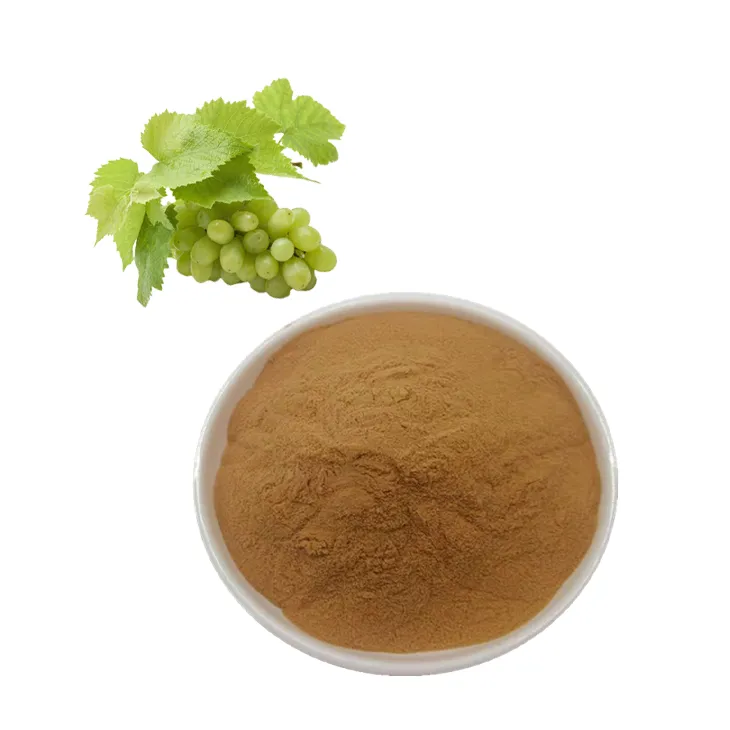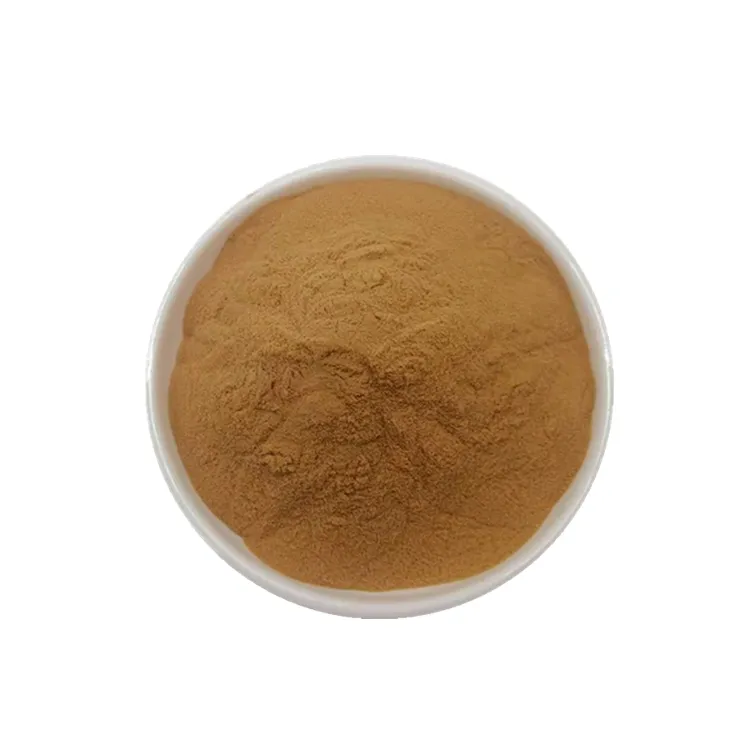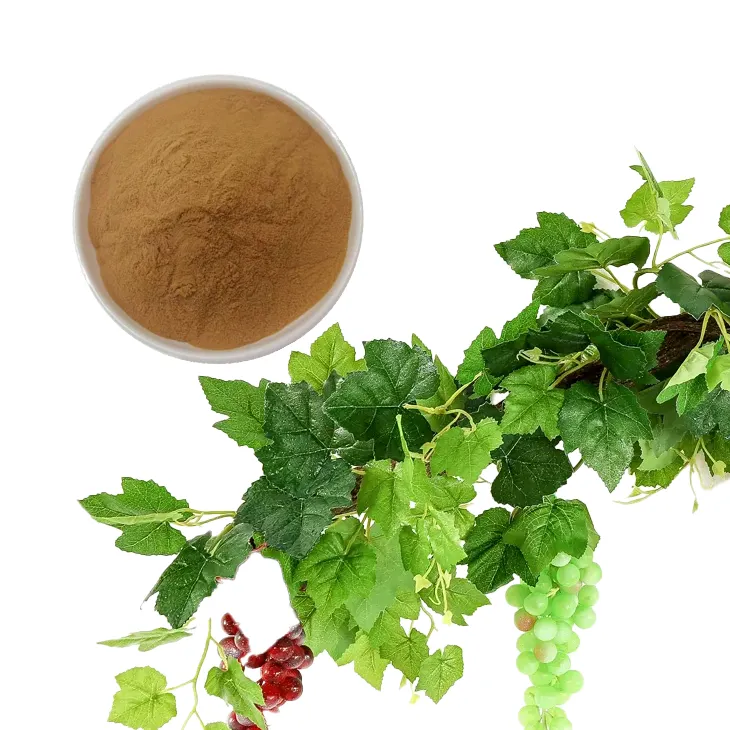- 0086-571-85302990
- sales@greenskybio.com
Organic Grape Leaf Extract with Trace Components
2024-12-01

Introduction
Organic Grape Leaf Extract has been emerging as a fascinating area of study in recent years. Despite being a trace component in the grand scheme of things, it holds remarkable potential. Grape leaves, often overlooked in favor of the more prominent grape fruits, are a rich source of various bioactive compounds. These compounds, even when present in small quantities, can have far - reaching effects on human health and various industries.

The Chemical Constituents of Organic Grape Leaf Extract
Polyphenols: One of the key groups of chemical constituents in Grape Leaf Extract are polyphenols. These include flavonoids such as Quercetin, kaempferol, and rutin. Quercetin, for example, is known for its antioxidant properties. It helps in neutralizing free radicals in the body, which are associated with various diseases including cancer and heart diseases. Kaempferol also has antioxidant and anti - inflammatory effects. Rutin is beneficial for strengthening blood vessels and can improve circulation.
Tannins: Tannins are another important component. They are responsible for the astringent taste of the extract. Tannins have been shown to have antimicrobial properties. They can inhibit the growth of certain bacteria and fungi, which makes them potentially useful in the field of medicine and food preservation.
Alkaloids: Although present in trace amounts, alkaloids in grape leaf extract may also play a role. Some alkaloids have been studied for their potential effects on the nervous system, although more research is needed to fully understand their implications in the context of grape leaf extract.

The Role of Organic Grape Leaf Extract in Promoting Wellness
Anti - Inflammatory Effects
The polyphenols and tannins in the grape leaf extract contribute to its anti - inflammatory properties. Inflammation is a natural response of the body to injury or infection, but chronic inflammation can lead to a host of diseases such as arthritis, diabetes, and cardiovascular diseases. By reducing inflammation, grape leaf extract may help in preventing or managing these conditions.
Studies have shown that the flavonoids in the extract can inhibit the production of inflammatory mediators such as cytokines. This modulation of the immune response can lead to a reduction in inflammation at the cellular level.
Anti - Aging Effects
The antioxidant properties of the grape leaf extract are closely related to its anti - aging effects. Free radicals are constantly generated in our bodies through normal metabolic processes as well as exposure to environmental factors such as pollution and UV radiation. These free radicals can damage cells, proteins, and DNA, which is one of the main causes of aging.
By scavenging free radicals, the antioxidants in the grape leaf extract can help protect cells from damage. This can lead to a reduction in wrinkles, improvement in skin elasticity, and overall slowing down of the aging process. Moreover, it may also have beneficial effects on internal organs, helping to maintain their function as we age.

The Influence of Sustainable Farming Practices on the Quality of the Extract
Soil Health: Sustainable farming practices that focus on maintaining soil health are crucial for the quality of grape leaf extract. Organic farming methods, for example, avoid the use of synthetic fertilizers and pesticides. This helps in preserving the natural soil microbiota, which in turn can influence the uptake of nutrients by the grape plants. A healthy soil with a diverse range of microorganisms can enhance the production of bioactive compounds in the grape leaves.
Water Management: Proper water management is also essential. Over - watering or under - watering can stress the plants, which may affect the composition of the grape leaves. Sustainable water management practices ensure that the plants receive the right amount of water at the right time. This can lead to healthier plants with leaves that have a more consistent and optimal chemical composition for extraction.
Pest and Disease Control: Instead of relying on chemical pesticides, sustainable farming uses natural methods such as biological control. This helps in reducing the chemical residues in the grape leaves. Organic grape leaves free from harmful pesticide residues are not only better for human consumption in the form of extracts but also ensure that the natural chemical constituents are not altered or contaminated by pesticides.
The Use of Organic Grape Leaf Extract in Alternative Medicine
Traditional Medicine Origins: Grape leaf extract has a long history of use in traditional medicine. In some cultures, it has been used to treat digestive disorders. The tannins in the extract can help in soothing the digestive tract and reducing inflammation in the gut. It has also been used topically for treating skin conditions such as wounds and eczema.
Modern Applications: In modern alternative medicine, grape leaf extract is being studied for its potential in treating more complex conditions. For example, its anti - inflammatory and antioxidant properties make it a candidate for complementary treatment in patients with autoimmune diseases. Some practitioners also recommend it for improving cardiovascular health, although more clinical trials are needed to establish its efficacy in these areas.
The Use of Organic Grape Leaf Extract as a Natural Additive
In the Food Industry: Grape leaf extract can be used as a natural additive in the food industry. Its antioxidant properties can help in preventing the oxidation of fats in food products, thereby increasing their shelf life. It can also add a unique flavor profile to certain foods, although its astringency needs to be carefully managed. For example, it could be used in the production of herbal teas or as a flavor enhancer in some fruit - based products.
In the Cosmetic Industry: In the cosmetic industry, the anti - aging and skin - soothing properties of grape leaf extract make it an attractive ingredient. It can be found in creams, lotions, and serums. It helps in moisturizing the skin, reducing wrinkles, and improving overall skin complexion. Additionally, its antimicrobial properties can also contribute to keeping the skin clean and free from infections.
In the Pharmaceutical Industry: In the pharmaceutical industry, grape leaf extract is being explored for its potential as a drug delivery system. The natural compounds in the extract can be used to encapsulate drugs, improving their stability and bioavailability. Moreover, the extract itself may be developed into new drugs for treating various diseases, especially those related to inflammation and oxidative stress.
Conclusion
Organic grape leaf extract, despite being a trace component, is a valuable natural resource. Its unique chemical constituents, with their diverse range of properties, offer great potential in promoting wellness, both in traditional and modern medicine. The influence of sustainable farming practices on its quality cannot be overstated, as it ensures the purity and efficacy of the extract. Its uses as a natural additive in various industries also highlight its versatility. As research continues to unfold, we can expect to see even more applications and a deeper understanding of this remarkable extract.
FAQ:
What are the unique chemical constituents in organic grape leaf extract?
Organic grape leaf extract contains various chemical constituents. Some of the notable ones include flavonoids, phenolic acids, and stilbenes. Flavonoids like Quercetin are known for their antioxidant properties. Phenolic acids contribute to the overall antioxidant and anti - inflammatory effects. Stilbenes, such as resveratrol (although in trace amounts), are associated with potential anti - aging benefits.
How does organic grape leaf extract promote wellness?
The extract may promote wellness in multiple ways. Its anti - inflammatory effects can help reduce inflammation in the body, which is associated with many chronic diseases. The antioxidant properties help combat oxidative stress, protecting cells from damage. It may also have anti - aging effects, potentially improving skin health and overall vitality.
What is the connection between sustainable farming practices and the quality of organic grape leaf extract?
Sustainable farming practices play a crucial role in the quality of organic grape leaf extract. Sustainable farming reduces the use of pesticides and chemical fertilizers. This leads to a cleaner and more natural growth environment for the grapevines. As a result, the grape leaves are less likely to be contaminated, and they may contain higher levels of beneficial compounds, leading to a higher - quality extract.
How is organic grape leaf extract used in alternative medicine?
In alternative medicine, organic grape leaf extract can be used in various forms. It may be used in herbal remedies as a tincture or in capsules. Some practitioners believe it can be used to treat conditions related to inflammation, such as arthritis. It may also be used in traditional medicine systems for its potential to improve digestion and circulation.
What are the applications of organic grape leaf extract as a natural additive?
As a natural additive, organic grape leaf extract can be used in the food and beverage industry. It can act as a natural preservative due to its antioxidant properties. In the cosmetic industry, it can be added to products like creams and lotions for its potential anti - aging and skin - nourishing effects.
Related literature
- The Chemical Composition of Organic Grape Leaf Extract and Its Health Benefits"
- "Sustainable Farming and the Quality of Grape - Derived Extracts"
- "Organic Grape Leaf Extract in Alternative Medicine: A Review"
- "The Use of Organic Grape Leaf Extract as a Natural Additive in Food and Cosmetics"
- ▶ Hesperidin
- ▶ citrus bioflavonoids
- ▶ plant extract
- ▶ lycopene
- ▶ Diosmin
- ▶ Grape seed extract
- ▶ Sea buckthorn Juice Powder
- ▶ Beetroot powder
- ▶ Hops Extract
- ▶ Artichoke Extract
- ▶ Reishi mushroom extract
- ▶ Astaxanthin
- ▶ Green Tea Extract
- ▶ Curcumin Extract
- ▶ Horse Chestnut Extract
- ▶ Other Problems
- ▶ Boswellia Serrata Extract
- ▶ Resveratrol Extract
- ▶ Marigold Extract
- ▶ Grape Leaf Extract
- ▶ blog3
- ▶ Aminolevulinic acid
- ▶ Cranberry Extract
-
The best lemon juice powder in nature.
2024-12-01
-
Organic Vitamin K2 Powder Suppliers
2024-12-01
-
Bulk purchase of L - tyrosine.
2024-12-01
-
Vitamin K2 Manufacturers
2024-12-01
-
Cat Claw Extract
2024-12-01
-
Eucommia Ulmoides Extract
2024-12-01
-
Garcinia Cambogia Extract
2024-12-01
-
Coix Seed Extract
2024-12-01
-
Konjac Powder
2024-12-01
-
Passionflower Extract
2024-12-01
-
Licorice Root Extract Powder
2024-12-01
-
Almond Extract Powder
2024-12-01
-
Feverfew Extract
2024-12-01
-
Oyster Mushroom Extract Powder
2024-12-01























